
Pan Tau is a character created for a children's television series. There were 33 episodes in 3 series made by the Czechoslovak Television (ČST) in cooperation with Barrandov Studios and the West German TV network Westdeutscher Rundfunk (WDR). A pilot film was shot in 1966, and 33 episodes were made from 1970 until 1979. The project ended with a feature film in 1988.

The Theatre on the Balustrade is situated in Prague, Czech Republic.

Jiří Lábus is a Czech actor. His brother is the Czech architect Ladislav Lábus.

The Little Mermaid is a 1976 Czechoslovak fantasy film directed by Karel Kachyňa based on the 1837 fairy tale "The Little Mermaid" by Hans Christian Andersen. The film won the Main Prize at 1977 Gijón International Film Festival. The plot faithfully follows Andersen's story, with the main difference that mermaids are portrayed as water nymphs with legs instead of fish tails.
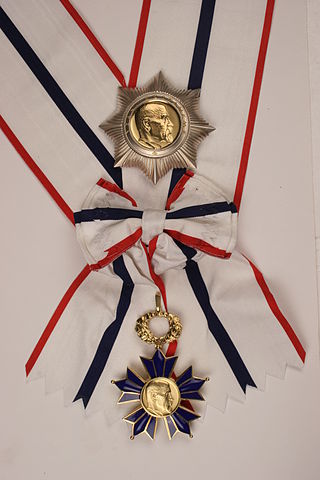
The Order of Tomáš Garrigue Masaryk is an Order of the Czech Republic and the former Czechoslovakia. It was established in 1990 after the Velvet Revolution, and re-established in 1994. The President of the Czech Republic awards it to individuals who have made outstanding contributions to the development of democracy, humanity and human rights. Unlike in the past, it is awarded to the Czech citizens and foreigners alike. The order has five classes, of which class I is the highest. The order is named in honor of Tomáš Garrigue Masaryk, an advocate of Czechoslovak independence and the first President of Czechoslovakia.

Jaroslav Křička was a Czech composer, conductor, and music teacher. He was the brother of poet Petr Křička[de].
Wrong Side Up is a 2005 Czech comedy-drama film written and directed by Petr Zelenka. It is an adaptation of Zelenka's play Tales of Common Insanity. It is a tale of people showing their internal loneliness by their choices in life. It was entered into the 27th Moscow International Film Festival.
Radúz and Mahulena is an 1898 stage play by Czech novelist Julius Zeyer. It was made into a film in 1970, directed by Petr Weigl.
Lotrando a Zubejda is a Czech musical fairy tale film directed by Karel Smyczek and written by Zdeněk Svěrák as an adaptation of two fairy tales: "Doctors" and "Highwaymen", by Karel Čapek, from the book Niner Fairytales: And One More Thrown in for Good Measure.
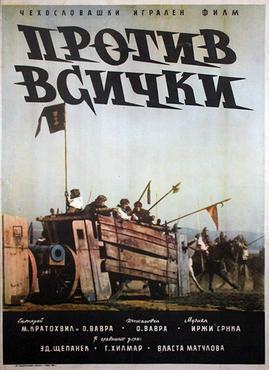
Against All is a 1956 Czechoslovak historical drama film directed by Otakar Vávra. It is based on the novel Proti všem by Alois Jirásek. The film's budget was 25 million KČs which made it the most expensive Czech film of the time. It is the third part of Vávra's cinematic Hussite Revolutionary Trilogy. The plot is set after Jan Žižka and concludes the entire trilogy. It takes place in 1420. The central motif of the film is the fight between the Hussites and the troops of the First anti-Hussite crusade led by the heir to the Bohemian throne, the Hungarian King and Holy Roman Emperor Sigismund of Luxemburg. We also follow the development of Tábor and the disputes between the moderate party of Jan Žižka and the radical Picarts of Petr Kániš.
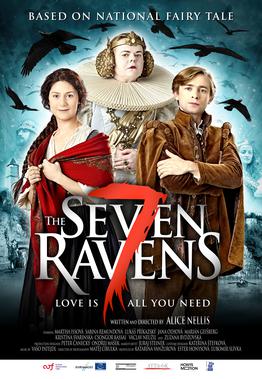
The Seven Ravens is a 2015 Czech-Slovak fairy tale film directed by Alice Nellis. The Seven Ravens is the story of a young woman who takes it upon herself to save her brothers and rid them of a curse which they were put under by their mother. It's a story about courage, endurance, and about the power of words, truth, and love. It's the story of how parents' mistakes fall on their children's shoulders, and how these children may either repeat them or correct them.

Martina Gasparovič Bezoušková is a Czech theatre and film actress and teacher.

Wonderful Times is a Czech retro television series. It was produced by Dramedy Productions, whose producers Filip Bobiňski and Petr Šizling created the series with screenwriter Rudolf Merkner. The plot takes place in Czechoslovakia and is set in real historical events that influence the stories of individual characters. Authors wanted to evoke atmosphere of the time with excerpts from Czechoslovak film weeklies of the time with original comments, by new historicizing commentary narrated by Vladimír Fišer, or by period music. The story is accompanied by the voice of the narrator, who was lent to the project by the actor Vojtěch Kotek and then by Matěj Hádek. The series was a large success and is considered one of the most successful projects of Czech Television.
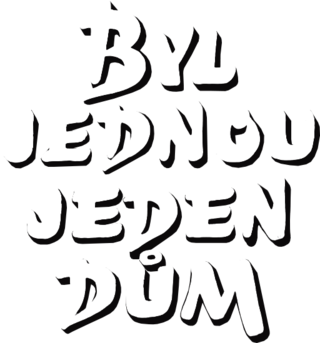
Byl jednou jeden dům is a television series first broadcast 1975. It takes place in a house located in fictional Bagounova Street.
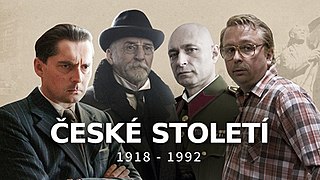
Czech Century (Czech: České století, is a Czech historical television series. It deals with the background of important historical events in Czech history since World War I to the Dissolution of Czechoslovakia. According to the creators, it is not a pure documentary series, but rather a film series "exposing the taboo of key events of our modern history". In particular, the series studies the psychology and mental motivations of individual actors of historical events in the moments when these personalities "had a knife to their throats" and were aware that their decision would affect not only their loved ones, but the entire nation for many years to come. The authors deliberately do not evaluate whether the persons in question behaved right or wrong from a historical point of view.
Arabela Returns is a fairy tale series from 1993. It is a sequel to the fairy tale series Arabela from 1980.

How to Wake a Princess is a 1977 Czechoslovak fantasy film directed by Václav Vorlíček. It is based on the fairy tale Sleeping Beauty, in the versions collected by Charles Perrault and the Brothers Grimm.

Čapkovy kapsy is a Czech crime comedy television series. It is a cycle of 12 short stories by Czech Television based on the stories of Karel Čapek. Each episode was directed by a different director.













